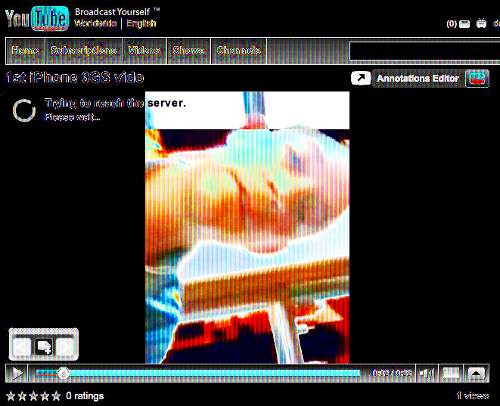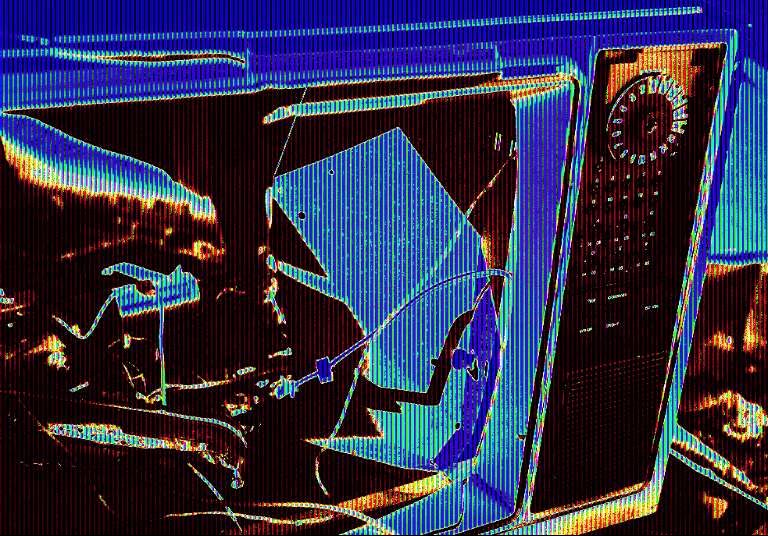The people who know what a Full HDTV is…
The same people who know what a Full HDTV is also make vertical videos with their mobile (Or: ‘Hacking in the Contribution Economy’).
Three years ago it all went pear-shaped in the audiovisual production industry. Final Cut, Apple’s professional video editing software package stopped being professional. After more than 10 years of editing, with millions of clients depending on this software, Apple decided to update it by getting rid of bits of functionality and changing the interface to make it more sell-able to amateur users. More than 8,000 professionals around the world petitioned Apple to free its code. And Apple, of course, ignored them. This is the problem with closed source software; it leads to dependence, so that when they mess you around, they really mess you around. What this software company was really doing though was adapting to changing economic and technological paradigms: there are millions of video users in the world, but not so many A/V professionals. Make a simpler, more effective tool, lower its price and rake in the money. Easy.
A typical conversation I hear between video editors is “Hey, have you gone over to version X yet?”, “Naah, I’m sticking with 7 as long as I can”. Video editors who refuse to switch to the less professional version are actually just trying to defend their maligned profession, and in doing so, their dignity. But the thing is, any good video amateur now has almost the same technical and creative skills as a professional. Bernard Stiegler[1] claims that most people’s basic level of technical knowledge has considerably increased.
“The development of information, audiovisual, and telecommunications systems that have converged within the digital field, constitutes a new stage in reproducibility as it becomes accessible to almost everyone; and at near zero cost. This lets all sorts of actors access functionalities that were previously only accessible to professionals.” [2]
If you then factor in the idea that we are all creative people (because we have no alternative), the result is a huge mass of people generating YouTube content. And no, these people aren’t the same audiovisual professionals who refuse to switch to the latest version of Final Cut. Stiegler calls this the era of the contribution-based economy, which is produced through our participation in social networks. We have become producers and consumers of our own content. It isn’t “an ownership economy (based on private property), but an implication economy based on the circulation of a libidinal energy engendered by sharing, by which the accumulation of value is distributed rather than captured” . [3] So basically, calm down! – because if the amateurs are the new worker bees of the contribution economy era, then Apple’s software is still a professional tool.

“I’m not stupid. I know the difference between an HD TV and a Full HD one. But what use is it if no-one is broadcasting in Full HD?” Beware of those people who know what Full HD is. The same people who then upload beautiful songs to Youtube and then add on horrible, badly animated images. Let’s admit that the Powerpoint aesthetic is part of the dominant mindset. [4] But just a second: they are the same people who make videos of their children with their phone cameras in vertical mode. We are all creative, but in fact some are more creative than others, and there is some technical knowledge, but it’s frankly a bit limited. It’s getting out of hand to the extent that there’s now a campaign [5] to put an end to the plague of those dreaded vertical videos.
So yes, we might learn the lessons but we’re not aiming for top marks. And the thing is, deep down, there is a bit of resistance (whether unintentional or otherwise). We don’t know what we’re doing but we’re doing it all the same, while at other times, we do know exactly what we’re doing. We, the contributors, have indeed figured out a few nuggets of knowledge – but we also do know how to flip it on its head.
And on a serious note, the hacker culture is capable of reversing the relationships at play in the contribution economy. Hacking means appropriating tools and networks to put them to other uses. We’re amateurs, yes, but rebel amateurs:
“You can – and obviously should – imagine sharing economies that don’t depend on the concept of the amateur. However, it is above all by these cultural practices and this new figure of the amateur that they engender within this new relational environment – both in the perhaps overly clever hacker culture variant and also in the sense that sharing music files constitutes the nucleus of an amateur musical practice, expressed in the act of choosing what to sample -, by which we can diverge from the usual idealised notion of what a contributor should be. Thus emerges the sharing economy: made of contributions that no-one asked for and which goes against the efforts of all those who might wish to protect their capacity to want – i.e., their power.”
If the culture industry has given way to the sharing economy era, where the key actors are amateurs on one side, and hackers on the other, then where are the old A/V professionals who still use the previous version of Final Cut? From my point of view, at least in the article cited here, Stiegler leaves out a fundamental element which also nourishes the sharing economy: the Precariat.
The thing is, we’re all aficionados but only some are professionals (i.e. well paid). If you are a creative type it’s easier to go viral with an internet video and make some money from YouTube than it is to be paid well for a documentary or corporate video for a medium-sized business (or even not so medium-sized). But the most important thing here is that every one of these precarious creative employees is as passionate as any amateur, even though they might wield the technical knowledge of a professional. And, above all, their most cherished idea is the promise that one day their situation will improve. That promise is what powers the motors of the machine.
What to do then, if you find yourself amongst the precariat?
1. Adapt: become an entrepreneur if you’ve got the cash, or be a youtuber if you’re young and live with your parents. Upload videos for free until your net value increases and then see what happens. If you are poor and/or old, this option might be difficult, and above all, forget about making music videos.
2. Resist: clench your fists and hold on like a champ. Keep accepting those precarious jobs and use your closest networks to keep yourself going and pay the bills. Meanwhile you can complain about taxes and the self-employment situation; maybe highlight the problem with ingenious internet campaigns and try to recover worker solidarity and mutual aid amongst your “guild-mates”. [6]
3. Crowd-funding (Ouch!): Extract some cash out of your local networks and maybe a few innocent bystanders, and try to push ahead with the project using only minimal resources. That’s fine for one job, but will the same formula work for the next ones? A while will have to go by before you can start on the next campaign.
4. Cooperate: start a cooperative and change the econ… OH WAIT. First of all, coops are cool, but if the definition of work still comes from the antiquated cultural industry paradigm and the old division between producer and consumer, this formula isn’t going to work. Be careful: you and your friends will just carry on exploiting yourselves. ¯\_(ツ)_/¯
You can’t leave the responsibility for changing things to a model of worker organisation that was designed for the capitalist-industrial context. Audiovisual production cooperatives are fine, but my intuition says they only work if we respond to the changing production paradigm. Not only do we need to hack the networks from our position of amateurs and contributors, which we in fact already do, whether that be resentfully or with pleasure, but we need to hack the relationships which sustain this new sharing economy so that it becomes an economy of redistribution rather than merely one of contribution. This redistribution can at least be a restraining element until the day when money can be definitively free and we can concentrate on what we came here to do: live well and TO THE MAX!
[1] Bernard Stiegler is Director of the lnstitut de recherche et d’innovation (IRI) at the Pompidou Centre, Paris.
[2] Bernard Stiegler Le « design » de nos existences a l’époque de l’innovation ascendante. Paris, Fayard, 2008
[3] Bernard Stiegler Le « design » de nos existences a l’époque de l’innovation ascendante. Paris, Fayard, 2008. This article was passed to me by J.M Catala.
[4] @eleptric doesn’t like it when people put photos on the songs they put up on YouTube, so I’m channelling his mean streak here.
[5] I got this from @xapo_ who tweeted it, but neither of us can find the original tweet. The network holds a memory but right now I can’t really remember where.
[6] Examples of resistance and awareness-raising like the Anonymous Survey that revealed the salaries of all the journalists in the Spanish state. Or the public condemnation by the CNT union of Playground Magazine. Or the recent creation of the Video Editing and Post Production Association of Catalunya.
Thanks go to Lucía Litjmaer, who as well as being a fast reader, notes down all the important bits.

Produced by Guerrilla Translation under a Peer Production License.
– Translated by Ale Fernandez and Guy James
– TV image by Regan Walsh on Flickr under a Creative Common Attribution-ShareAlike 2.0 Generic licence. Vertical video image by David Kind on Flickr under a Creative Commons Attribution-Non-Commercial-ShareAlike 2.0 Generic licence. Both images remixed by Guy James.
– Original article published on Nativa.cat
